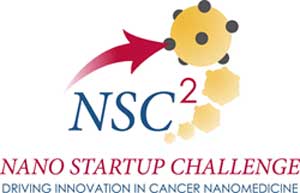| Posted: Sep 20, 2016 | |
Winning teams of the Nanotechnology Startup Challenge in Cancer(Nanowerk News) Ten winners of the Nanotechnology Startup Challenge in Cancer (NSC2) were announced today by the Center for Advancing Innovation (CAI). The challenge featured eight inventions, conceived and developed by scientists from three participating institutes of the National Institutes of Health (NIH) -- the National Cancer Institute (NCI), the National Institute of Biomedical Imaging and Bioengineering (NIBIB), and the National Heart, Lung, and Blood Institute (NHLBI) -- as well as extramural, “third-party” inventions, which were discovered and advanced outside of the NIH. The winning entrepreneurs were selected based on 10-page business plans, financial models, and 20-minute “live pitches” to a panel of expert judges. |
|
 |
|
| Winning teams will move forward to the third and final phase of the challenge - the Startup Phase. In this phase, the winning teams will form their startups to advance cancer nanotechnology inventions. Teams that received the Innovation Excellence Award will receive a $2000 cash award. All teams that were accepted into the challenge were placed in an accelerator program with a rigorous advancement process, which was independent from the inventions they chose, and only those teams who met the criteria advanced to Phase 2. | |
| The Nanotechnology Startup Challenge is supported by regional partners such as MedImmune, the global biologics research and development arm of AstraZeneca, which shares a vision of strengthening the Virginia, Maryland, and Washington, D.C. regional biomedical ecosystem and spurring economic growth. Two winners are located in the BioHealth Capital Region. | |
| The winning teams, their chosen nanotechnology inventions, and their target indications are: | |
|
Illinois Institute of Technology - RA
Medical College of Wisconsin - GX
Thomas Jefferson University - MW
University of Cambridge - ZB
University of Cambridge - JC
Wake Forest University - DAP
University of Maryland School of Medicine - CV
Medical University of South Carolina - EDH
Wake Forest School of Medicine - ET
ECF Biosolutions - ECF
|
|
| “The challenge has provided a new channel to advance practical applications of nanotechnology to cancer and further galvanized the community as a whole,” said Piotr Grodzinski, Ph.D., director of the NCI Alliance for Nanotechnology in Cancer program. “Importantly, the entrepreneurial training and engagement of industry mentors in the challenge facilitates a new bond connecting industry and the research community enabling more effective technology transfer.” | |
| NSC2 opened for entry in October 2015 and enrolled over 250 aspiring entrepreneurs and 28 teams. Throughout the challenge, these teams participated in CAI’s required accelerator training and were educated by leading experts from the biotechnology industry, venture capital, universities, foundations, and government. This virtual training was offered free of charge to NSC2 participants and included over 30 webinars on commercialization planning, research and development planning, intellectual property, regulatory strategy, financial modeling, and more. In the final phase of NSC2, each winning team will be mentored on launching their startup, incorporating a business, licensing, forming a management team, and raising seed money from investors. | |
| "When this challenge was announced, I was hopeful that it would inspire innovators from across the country to help NIH bring promising inventions to patients. In fact, the challenge attracted worldwide interest, with participants representing 28 cities across 13 countries," said Lloyd Whitman, Assistant Director for Nanotechnology and Advanced Materials at the White House Office of Science and Technology Policy. "The winners will now have a unique opportunity to get expert assistance in creating their startups and bringing to market new therapies for some of the most difficult to treat cancers." | |
| “The promise of the startups being launched from the challenge is evidence of the innovation that runs strong throughout the BioHealth Capital Region,” said Reg Seeto, Vice President, Head of Partnering and Strategy at MedImmune. “Partnered with CAI, we will continue to accelerate the development of such new initiatives, putting in place high-impact startups within the biotech ecosystem.” | |
| Rosemarie Truman, founder and CEO of the CAI added, “Now in our fourth challenge, the Nanotechnology Startup Challenge in Cancer creates another platform to further amplify entrepreneurial platforms around the world given the rigorous accelerator education offered. We continue to raise the bar in the challenge framework to boost and accelerate the advancement of life-saving biomedical inventions.” |
| Source: National Cancer Initiative |
